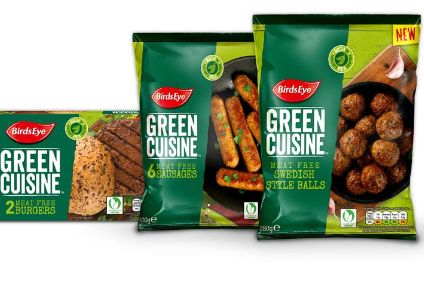
Frozen-food sales in the UK have shown signs of melting in recent weeks as shopping habits return to normal, Kantar data released by industry body The British Frozen Food Federation (BFFF) shows.
However, the BFFF sought to underline how the category is still worth GBP1bn (US$1.37bn) more than two years ago.

Discover B2B Marketing That Performs
Combine business intelligence and editorial excellence to reach engaged professionals across 36 leading media platforms.
In the 13 weeks to 13 June, the UK’s frozen-food category saw sales fall 5.7% by value and 7.1% by volume, according to the Kantar data. The value of the fresh and chilled category was down 1.2% in value terms and by 5.1% when volumes are measured.
“In 2020, fresh and chilled was growing behind frozen so the year-on-year comparison on 12 weeks maybe skewed by this,” a presentation provided by the BFFF read.
“Across the whole grocery market, we are seeing sales being behind last year when the foodservice market was largely closed.
“We are now seeing the value growth of the frozen market slowing down as shoppers return to more normal shopping patterns.

US Tariffs are shifting - will you react or anticipate?
Don’t let policy changes catch you off guard. Stay proactive with real-time data and expert analysis.
By GlobalData“However the market remains nearly GBP1bn higher than the 52 weeks ended June 2019, with an additional 241 tonnes of volume.”
Kantar’s figures for the 52-week period ending 13 June reveal frozen-food sales outperformed total grocery growth in both value (7.8% compared to 6.9%) and volume (5.2% compared to 4.8%) terms.
While accepting the value growth of the frozen market is slowing down as consumers return to more normal shopping patterns, Richard Harrow, chief executive of the BFFF, believes frozen will remain on an upward trajectory.
“Frozen food has, in the last 12 months, become the fastest growing sector in retail, after alcohol. Of course, much of this growth has been the result of the pandemic, which after the shutters came down on out-of-home, saw the return of the big weekly shop, from which frozen directly benefited,” he said.
“Further insights from the latest Kantar figures also suggest that frozen will continue to be a winner. All nine of the categories are showing growth in both value and volume, with three categories – ice cream, fish and savoury – showing double-digit growth.”
Data suggests Gen Z consumers are at the forefront of the frozen meal surge, Harrow said: “As well as convenience being of utmost importance, Gen Z consumers place a higher value on flavour and quality of ingredients, as opposed to seeking out brands.”
He added: “Frozen has always been recognised as a great value option, but value is now combined with innovation as companies work to develop high-quality frozen free-from products, sustainable packaging solutions and plant-based meals.”
Just Food archive: Beyond Covid-19 – will frozen food see long-term boost in UK?





